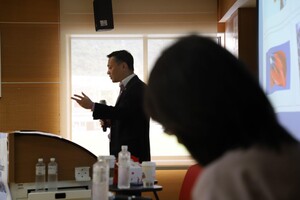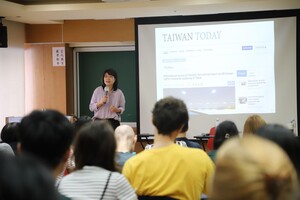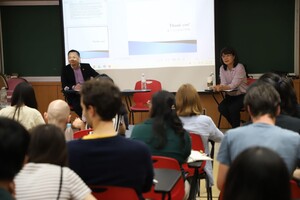ICI Associate Professor Kevin Chang and NTU Law Professor Wen-Chen Chang Converse on International Law's Role in Taiwan's Security



Date :
2023-11-10
Department :
International College of Innovation
【Article by International College of Innovation】
Amidst growing geopolitical tensions, a profound conversation unfolded at the International College of Innovation, where legal scholars deliberated on the safeguarding of Taiwan's security through the power of international law. On October 25th, Associate Professor Kevin Chang of the ICI was joined by the esteemed Professor Wen-Chen Chang from the National Taiwan University Law Department, centering their dialogue on the theme "Safeguarding Taiwan's Security Through the Power of International Law." The discussion delved into the intricate interplay between international law and Taiwan’s security, offering insight drawn from extensive legal expertise and proposing strategic approaches that must be adopted by Taiwan strategies in the face of escalating security threats.
Professor Kevin Chang commenced the seminar by reminding the audience of the essential place of international law in global governance and world order. From things we take for granted such as air travel safety and customs, to safeguarding state sovereignty, protection of human rights, and the conduct of warfare, international law is indispensable to not only our daily lives, but importantly, the safety and freedom of individuals and states. . Professor Chang underscores the centrality of 'statehood' under international law. Despite Taiwan's exclusion from the United Nations, Professor Chang asserted that Taiwan undeniably qualifies as a sovereign state under international law, referencing Taiwan’s satisfaction of the well-accepted criteria of the Montevideo Convention on the Rights and Duties of States, and furthermore, and the reality of long-standing effective control and exclusive governance of the Taiwan, Penghu, Kinmen and Matsu territories. The assertion of statehood, Professor Chang says, must be the focus of Taiwan’s foreign policy, given that states are the primary subjects of international law, and that respect for state sovereignty is the cornerstone of the United Nations Charter, which accords protection for the territorial integrity of every state, not only UN member states.
As a state under international law, Taiwan is accorded a range of rights and responsibilities. Professor Chang observes that, despite the importance of international law, it is a discipline that is not generally taught at universities. Discussions on international law are also almost completely absent from Taiwanese media. Referencing his own experience as a senior international law advisor in the Australian Government, Professor Chang observes that Taiwan’s foreign policy has not always applied international law as guiding principles under which it engages and cooperates with states. Professor Chang believes that this lack of understanding and utilization of international law poses a big risk to Taiwan’s security.
Professor Chang proposes that it is imperative that Taiwan better utilize the power of international law through four approaches: Firstly, by asserting of Taiwan’s sovereign rights as a state; secondly, through our response to foreign security threats; thirdly, by pledging our support for international justice and accountability; and finally, through strengthening Taiwan’s own institutional capabilities.
On international justice, Professor Chang urges Taiwan to commence the process of ratifying the Rome Statute of the International Criminal Court (ICC). While that may be a medium-term task, Profssor Chang urges that Taiwan should immediately accept jurisdiction of the ICC under Article 12(3) of the Rome Statute, and domestically legislate the four international core crimes: genocide, crimes against humanity, war crimes, and crime of aggression. Professor Chang notes that an Article 12(3) declaration is already an unimplemented task from the Recommendations adopted by the International Review Committee of Taiwan’s ‘Two Human Rights Covenants’. Highlighting its independence from the United Nations Professor Chang believes Taiwan already fulfills the criteria of being a state party to the Rome Statute. Accepting ICC jurisdiction would not only be a deterrence against any state that may wish to attack Taiwan, he says, it would also send a profound statement to the world that Taiwan will be part of the international community that is committed to end impunity for the worst crimes of humankind.
Building on Professor Kevin Chang’s exposition, Professor Wen-Chen Chang addressed the tangible effects of international legal instruments on human rights within Taiwan. She elaborated on the domestication of pivotal UN human rights covenants, exemplified by Taiwan’s incorporation of the International Covenant on Civil and Political Rights and the International Convention on the Elimination of All Forms of Discrimination Against Women into national law. Taiwan’s proactive measures in engaging UN-experienced international experts to review and enforce human rights conventions were highlighted, reflecting a commitment to operationalize international human rights standards.
Addressing the pivotal concerns of national security, Professor Wen-Chen Chang posited that Taiwan’s active engagement with the international legal system could grant other nations a legal pretext to provide support in situations where Taiwan is subject to acts contravening international law. She drew parallels with the recent conflict in Ukraine, noting how Ukraine’s acceptance of the ICC’s Rome Statute jurisdiction empowered the International Court to demand a cessation of the Russian invasion in early 2023—a vital precedent underscoring the necessity of legal frameworks in international aid and intervention.
The conversation also turned to the unique case of Hong Kong, where, despite China’s non-ratification of certain UN covenants, the territory continues to submit human rights reports to the UN, attracting global scrutiny to any human rights transgressions. Professor Wen-Chen Chang accentuated the imperative of Taiwan's integration into the international legal system as a bastion for its human rights and security.
The subsequent interactive session, led by Associate Professor Vivianne Weng of the Political Science Department, NCCU, saw a vibrant exchange of queries from an international assembly of students, sparking an intellectual cascade of discussions that significantly enriched the dialogue. The erudite presentations and debates substantially deepened the audience’s comprehension of international law and underscored the nuanced challenges and prospects facing Taiwan’s security in a polarized global environment.
Amidst growing geopolitical tensions, a profound conversation unfolded at the International College of Innovation, where legal scholars deliberated on the safeguarding of Taiwan's security through the power of international law. On October 25th, Associate Professor Kevin Chang of the ICI was joined by the esteemed Professor Wen-Chen Chang from the National Taiwan University Law Department, centering their dialogue on the theme "Safeguarding Taiwan's Security Through the Power of International Law." The discussion delved into the intricate interplay between international law and Taiwan’s security, offering insight drawn from extensive legal expertise and proposing strategic approaches that must be adopted by Taiwan strategies in the face of escalating security threats.
Professor Kevin Chang commenced the seminar by reminding the audience of the essential place of international law in global governance and world order. From things we take for granted such as air travel safety and customs, to safeguarding state sovereignty, protection of human rights, and the conduct of warfare, international law is indispensable to not only our daily lives, but importantly, the safety and freedom of individuals and states. . Professor Chang underscores the centrality of 'statehood' under international law. Despite Taiwan's exclusion from the United Nations, Professor Chang asserted that Taiwan undeniably qualifies as a sovereign state under international law, referencing Taiwan’s satisfaction of the well-accepted criteria of the Montevideo Convention on the Rights and Duties of States, and furthermore, and the reality of long-standing effective control and exclusive governance of the Taiwan, Penghu, Kinmen and Matsu territories. The assertion of statehood, Professor Chang says, must be the focus of Taiwan’s foreign policy, given that states are the primary subjects of international law, and that respect for state sovereignty is the cornerstone of the United Nations Charter, which accords protection for the territorial integrity of every state, not only UN member states.
As a state under international law, Taiwan is accorded a range of rights and responsibilities. Professor Chang observes that, despite the importance of international law, it is a discipline that is not generally taught at universities. Discussions on international law are also almost completely absent from Taiwanese media. Referencing his own experience as a senior international law advisor in the Australian Government, Professor Chang observes that Taiwan’s foreign policy has not always applied international law as guiding principles under which it engages and cooperates with states. Professor Chang believes that this lack of understanding and utilization of international law poses a big risk to Taiwan’s security.
Professor Chang proposes that it is imperative that Taiwan better utilize the power of international law through four approaches: Firstly, by asserting of Taiwan’s sovereign rights as a state; secondly, through our response to foreign security threats; thirdly, by pledging our support for international justice and accountability; and finally, through strengthening Taiwan’s own institutional capabilities.
On international justice, Professor Chang urges Taiwan to commence the process of ratifying the Rome Statute of the International Criminal Court (ICC). While that may be a medium-term task, Profssor Chang urges that Taiwan should immediately accept jurisdiction of the ICC under Article 12(3) of the Rome Statute, and domestically legislate the four international core crimes: genocide, crimes against humanity, war crimes, and crime of aggression. Professor Chang notes that an Article 12(3) declaration is already an unimplemented task from the Recommendations adopted by the International Review Committee of Taiwan’s ‘Two Human Rights Covenants’. Highlighting its independence from the United Nations Professor Chang believes Taiwan already fulfills the criteria of being a state party to the Rome Statute. Accepting ICC jurisdiction would not only be a deterrence against any state that may wish to attack Taiwan, he says, it would also send a profound statement to the world that Taiwan will be part of the international community that is committed to end impunity for the worst crimes of humankind.
Building on Professor Kevin Chang’s exposition, Professor Wen-Chen Chang addressed the tangible effects of international legal instruments on human rights within Taiwan. She elaborated on the domestication of pivotal UN human rights covenants, exemplified by Taiwan’s incorporation of the International Covenant on Civil and Political Rights and the International Convention on the Elimination of All Forms of Discrimination Against Women into national law. Taiwan’s proactive measures in engaging UN-experienced international experts to review and enforce human rights conventions were highlighted, reflecting a commitment to operationalize international human rights standards.
Addressing the pivotal concerns of national security, Professor Wen-Chen Chang posited that Taiwan’s active engagement with the international legal system could grant other nations a legal pretext to provide support in situations where Taiwan is subject to acts contravening international law. She drew parallels with the recent conflict in Ukraine, noting how Ukraine’s acceptance of the ICC’s Rome Statute jurisdiction empowered the International Court to demand a cessation of the Russian invasion in early 2023—a vital precedent underscoring the necessity of legal frameworks in international aid and intervention.
The conversation also turned to the unique case of Hong Kong, where, despite China’s non-ratification of certain UN covenants, the territory continues to submit human rights reports to the UN, attracting global scrutiny to any human rights transgressions. Professor Wen-Chen Chang accentuated the imperative of Taiwan's integration into the international legal system as a bastion for its human rights and security.
The subsequent interactive session, led by Associate Professor Vivianne Weng of the Political Science Department, NCCU, saw a vibrant exchange of queries from an international assembly of students, sparking an intellectual cascade of discussions that significantly enriched the dialogue. The erudite presentations and debates substantially deepened the audience’s comprehension of international law and underscored the nuanced challenges and prospects facing Taiwan’s security in a polarized global environment.
